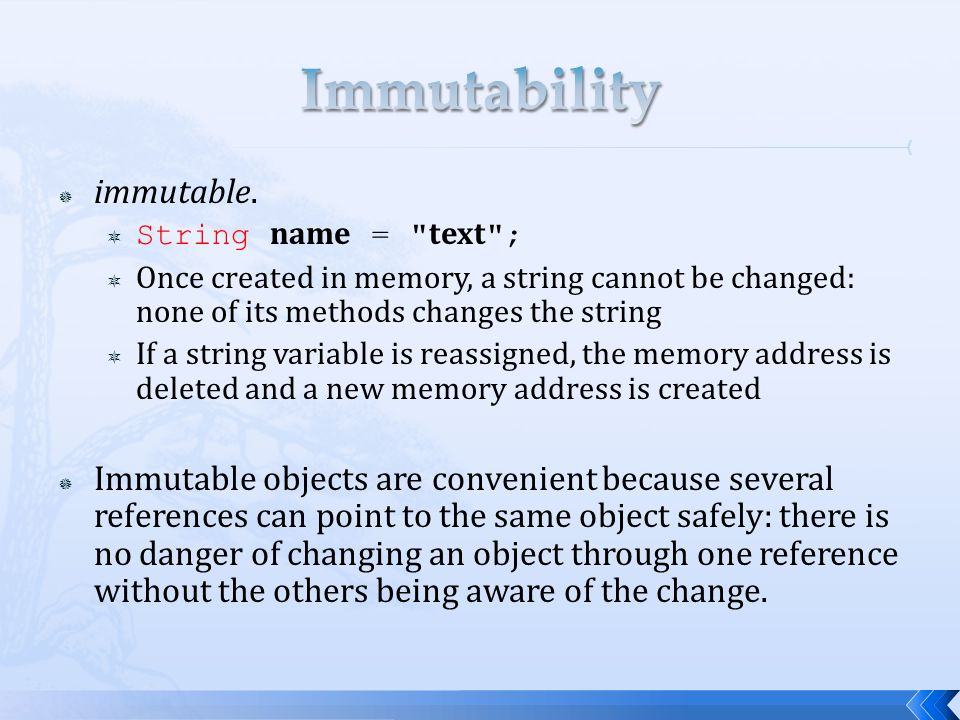Why Are Strings Immutable in Java? Comprehensive Overview for Beginners
Why Are Strings Immutable in Java? Comprehensive Overview for Beginners
Blog Article
Immutable Strings: A Key Element in Ensuring Data Uniformity and Dependability
In the world of information monitoring, the significance of unalterable strings can not be overstated. The concept of unalterable strings goes beyond simple triviality; it is a cornerstone in the facility internet of data governance.
The Idea of Immutable Strings
Immutable strings, a basic principle in programs, describe strings that can not be modified once they are developed. Essentially, as soon as a string worth is designated, any kind of procedure that shows up to change the string actually produces a new string. This immutability makes certain data uniformity and reliability in applications, as it stops unexpected modifications to the original information.
Benefits in Information Uniformity

Data consistency is crucial in different facets of software application development, consisting of data source administration, multi-threaded settings, and dispersed systems (Why are strings immutable in Java?). Immutable strings add considerably to accomplishing this uniformity by avoiding information corruption due to simultaneous access. In scenarios where multiple processes or threads communicate with the same information all at once, immutable strings function as a guard versus race conditions and synchronization issues
Additionally, the immutability of strings simplifies debugging and testing processes. With unalterable strings, developers can rely on that as soon as a string is set, it will continue to be unmodified, making it simpler to map the source of mistakes and guaranteeing that examination situations produce consistent results. This dependability in information handling inevitably causes extra durable and secure applications.

Implementing Immutable Strings
Ensuring the immutability of strings needs a thoughtful technique to their implementation in software application growth. One vital technique is to develop string courses in a manner that stops alterations when a string things is produced. By making strings immutable, programmers can improve data uniformity and integrity in their applications.
To implement immutable strings effectively, designers should prefer creating brand-new string things as opposed to changing existing ones. This technique ensures that when a string is appointed a value, it can not be transformed. Additionally, any type of operation that shows up to customize the string needs to produce a brand-new string with the wanted modifications rather than changing the initial.
Moreover, utilizing unalterable strings can simplify concurrency management in multi-threaded atmospheres. Considering that immutable strings can not be transformed after creation, they can be safely shared among multiple threads without the danger of data corruption.
Role in Dependability Guarantee
In software application growth, the usage of immutable strings plays an essential function in ensuring the reliability of information procedures. Immutable strings, when produced, can not be customized, making sure that the data they represent continues to be constant throughout the application's execution. This immutability property gives a degree of assurance that the information being refined will not be accidentally changed, Read More Here causing unforeseen end results or errors in the system.
By including immutable strings into software program style, developers can improve the reliability of their applications by decreasing the risks linked with mutable information - Why are strings immutable in Java?. Unalterable strings help in preventing information corruption or unintended adjustments, which can be particularly essential when managing sensitive information or when data stability is extremely important
Furthermore, using immutable strings simplifies concurrent processing, as multiple strings can safely access and share string data without the threat of one string changing the content while another reads it. This facet contributes considerably to the overall dependability of the software system, making sure consistent and predictable actions in information handling operations.
Applications and System Combination
The seamless assimilation of immutable strings into different applications and link systems is critical for making sure durable information consistency and dependability across diverse technical settings - Why are strings immutable in Java?. Immutable strings play a critical role in enhancing the honesty of information exchanges and communications within complicated software application ecosystems. By incorporating unalterable strings into applications, developers can alleviate the threats associated with information tampering, unapproved alterations, and inadvertent modifications, thus strengthening the overall protection position of the system
In the context of system combination, immutable strings function as a fundamental component for establishing protected communication networks and helping with seamless information transfers in between various components. Their immutable nature ensures that data transferred between systems stays unchanged and verifiable, decreasing the wikipedia reference possibility of variances or errors that might endanger the stability of the whole system. Additionally, immutable strings can boost interoperability between disparate systems by providing a standardized layout for information representation, making it possible for a lot more reliable information handling and exchange protocols across interconnected systems. By embracing immutable strings in applications and system combination processes, companies can fortify their data facilities and promote the integrity and uniformity of their info assets.
Verdict
Finally, unalterable strings play a critical function in keeping data consistency and reliability in different applications and system integrations. By making certain that strings can not be changed once produced, the integrity of information is preserved, lowering the danger of errors and inconsistencies. Applying immutable strings can considerably improve the dependability of systems, inevitably resulting in even more exact and reliable data handling.

Report this page